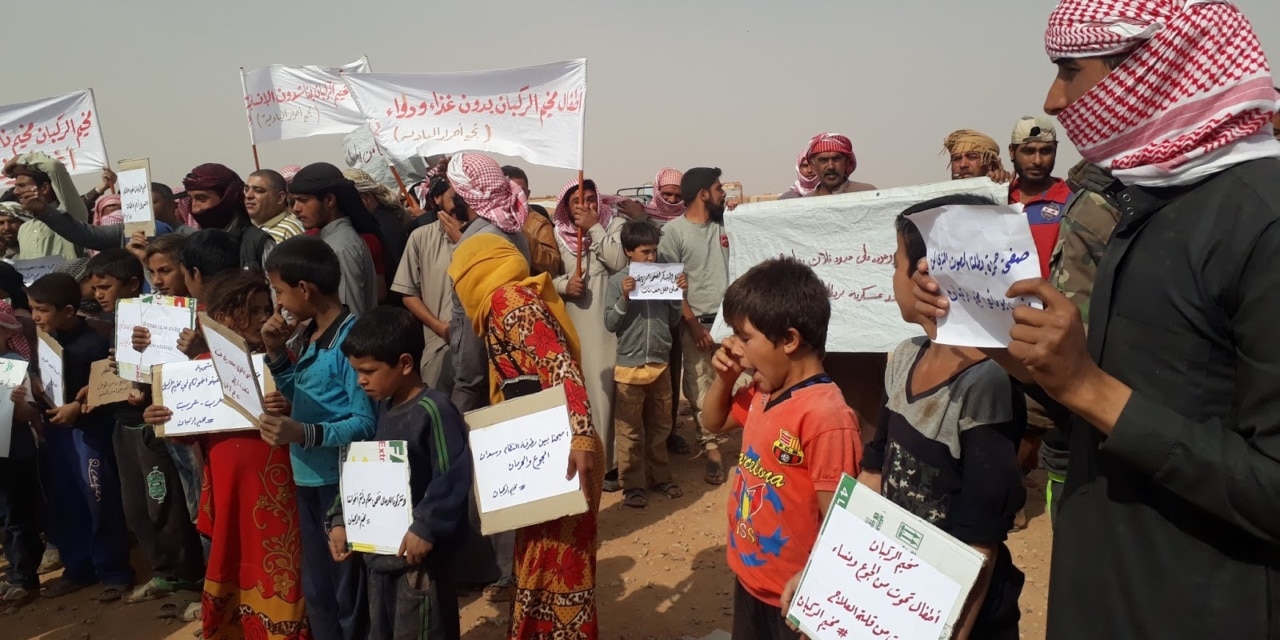Residents of the Rukban camp protest conditions and a regime siege, southeast Syria, October 10, 2018 (Omar a-Shawi)
UPDATE, 1245 GMT:
Turkish President Recep Tayyip Erdoğan has told Russian counterpart Vladimir Putin that the Russian-regime attacks on Idlib Province in opposition-held northwest Syria are causing a “major humanitarian crisis”.
Erdoğan said in a phone call that the pro-Assad offensive and assaults on civilian areas, which broke a demilitarized zone announced by Moscow and Ankara last September, damage efforts at a political resolution of Syria’s 101-month conflict and threaten Turkey’s national security.
A Kremlin statement made no reference to a halt to attacks. Instead, it claimed the presidents agreed to “activate mutual efforts with the goal of liquidating the terrorist threat” in Idlib.
At the start of August, Turkey, Russia, and Iran held the 13th round of talks in the Kazakh capital Astana. But days later, Russia and the regime resumed their offensive in northern Hama and southern Idlib Province, breaking anti-Assad resistance that had checked the assault for more than two months.
Syrian State news agency SANA said on Friday that regime forces had completed the recapture of northern Hama, with anti-Assad fighters retreating around the Turkish observation at Morek, on the M5 highway between Aleppo and Homs.
Russia has said it will escort Turkish troops out of the surrounded post, but Ankara has so far resisted withdrawal.
Syria Daily, August 22: Turkey and Russia in Talks Over Fate of Opposition-Held Northwest
It is surrounded by love, stuffed animals and balloons. https://t.co/oHZaGgn6cn
— Elizabeth Tsurkov (@Elizrael) August 23, 2019
ORIGINAL ENTRY: A UN mission to the besieged Rukban camp in southeast Syria has been met with scepticism and concern by the displaced residents who fear pressure to return to their homes, according to local activists and some of those in the camp.
The UN, accompanied by the Syrian Arab Red Crescent, arrived on Sunday to carry out a survey of the estimated 11,000 displaced who remain in the barren area near the Jordan border. Residents reported on Thursday that the UN staff were folding up tents and preparing to depart.
About 80 UN and SARC personnel were involved in the operations. There were no medical staff among them, and no aid for residents who are facing near-exhaustion of food, medicine, and other essential supplies.
One of the residents responded bluntly to the mission, “You are conspiring against the people in the camp, and we don’t want to go back because Assad is a criminal who will kill us.”
Told he must write his full name on the form for the survey, he responded, “You want to know our names to arrest us when we return.”
Residents have received news of the interrogations of men in the regime-controlled centers in central Syria, and there have been reports of disappearances. In April, three men were killed by regime personnel, reportedly because they tried to stop the harassment of a woman.
See Syria Daily, May 3: More Departures from Rukban Camp — and More Claims of Disappearances
Another resident summarized, “Very few people wanted to go back.” He estimated the total at only 50 families.
He confirmed that many had refused to provide their names.
A local aid worker said the UN did not apply any pressure for departures; however, he added that the staff told inquiring residents, “We can’t give you a promise when we bring aid.”
In a statement last week, camp leaders asked for “regular, organised food and medical aid to those who wish to remain in Rukban”, international protection, and the option for residents of transfer to opposition-held northwest Syria.
See also The Choice for Rukban’s Besieged: Starve or Risk Detention by Regime
Residents said those who are not leaving the camp will meet UN officials — separately from the Syrian Arab Red Crescent, seen by many as working for the Assad regime’s intelligence services — “to try to find sustainable solutions”. The meetings, including “community representatives”, will “assess key needs and understand the requirements of those who have chosen to stay”.
The Ongoing Siege
Rukban once held more than 50,000 civilians, who fled home areas from 2015 because of Islamic State attacks. It has been under siege since last September, when Assad regime forces cut the main route into the camp. Since January 2018, Damascus has allowed only two UN aid convoys to reach Rukban.
The restriction on supplies has been compounded by the closure of the Jordanian border since 2016, following an Islamic State suicide bombing that killed Jordanian personnel. The US military has refused to provide assistance, even though Rukban lies within a 55-km security zone around the American base at Tanf on the Iraqi border.
In the UN’s previous visit in February, more than 90% of residents said they wanted to return to their homes. However, almost all said they feared detentions, forced conscriptions, and harassment by regime officials, as well as uncertainty over the status of their property.
But the ongoing siege, backed up by Russian propaganda and operations around Rukban, brought residents to the point of starvation and medicine and other supplies were exhausted. So there has been a series of departures to centers in central Syria, reducing the camp population by about 80%.
However, Shukri Shehab, a local camp official, summarized the position of the thousands who have held out. “We will stay until the last breath because we fear what awaits us if we return to the regime.”
See Syria Daily, July 29: 1000s Hold Out v. Starvation in Besieged Rukban Camp
“I’m not considering going back to regime territory,” a young resident told Madeline Edwards of The New Humanitarian. “Give us another choice.”
Yara, a mother of six, said, “We don’t want to return to regime territory. Returning to the regime isn’t safe. What we want is to go to the north to find a safe area where we can stay, an area with stability.”
The UN has yet to make a statement about this week’s mission.


Trackbacks/Pingbacks